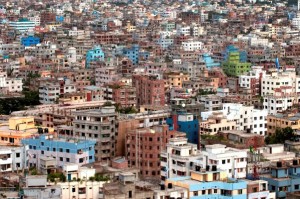 While the rest of the world is urbanizing, Latin America is urbanized. The region has four of the world’s 19 megacities (cities with populations over 10 million people) and 78% of all its people currently live in urban areas. Latin America’s concerns over urbanization, therefore, are based on the substantial amount of people currently in cities as opposed to the anticipation of populations to come. For example, of the one billion increase cities will experience by 2025, the United Nations estimates Latin America will only add about 127 million to its population. This is not insignificant for sure, but the slower rate of urbanization does change the nature in which urban planning occurs.
While the rest of the world is urbanizing, Latin America is urbanized. The region has four of the world’s 19 megacities (cities with populations over 10 million people) and 78% of all its people currently live in urban areas. Latin America’s concerns over urbanization, therefore, are based on the substantial amount of people currently in cities as opposed to the anticipation of populations to come. For example, of the one billion increase cities will experience by 2025, the United Nations estimates Latin America will only add about 127 million to its population. This is not insignificant for sure, but the slower rate of urbanization does change the nature in which urban planning occurs.
Decentralization is the key to dealing with urbanization in Latin America. The area is unique in that its urban populations tend to live in one leading city. The concentration of economic activity and public services, as well as changing rural economies, have driven people to these urban cores over the past few decades. Haiti’s 2010 earthquake and its aftermath certainly reinvigorated the need for decentralization in protecting the physical, social, and economic well-being of struggling communities. Though the quake was natural in its occurrence, it was unnatural for approximately four million people to be living in a capital city built for a few hundred thousand. The premise of decentralization focuses on spreading resources and opportunities across a country as a way of influencing where people choose to settle.
Small and medium-sized cities have the potential to spearhead decentralization initiatives. In fact, the majority of the urbanization expected for the rest of the world is slated to take place in these smaller cities and towns. Promoting areas that are able to accommodate additional growth allows planners to strengthen existing communities rather than create new ones. The challenge, however, is local leaders in these smaller communities typically lack the fiscal and technical ability to plan for large-scale urban development.
Additionally, decentralization efforts are often limited to reprioritizing infrastructure investments and to relocating people. The conflicting interests of national governments, international funding organizations and other external entities frequently overlook the need to restructure governing responsibilities in a way that is inclusive of local governments. Poor communication and political impasses foster situations where various governing actors are unsure of their specific responsibilities and not enough community improvements are made as a result. Decentralization has to be coupled with a solid effort to support the capacity of municipal governments if it is to be successful.
The heavy concentration of city dwellers is not the main problem facing Latin America. Cities should thrive and be vibrant, desirable place for people to live. To properly deal with the ensuing urbanization though, decentralization has to allow for a concurrent redistribution of financial and political resources so local governments can fulfill their basic functions. It is the hope that national and international actors will continue to explore opportunities to localize how they deal with urbanization.
As originally featured in the Urban Times.


About The Author: Vanessa L.
More posts by Vanessa L.